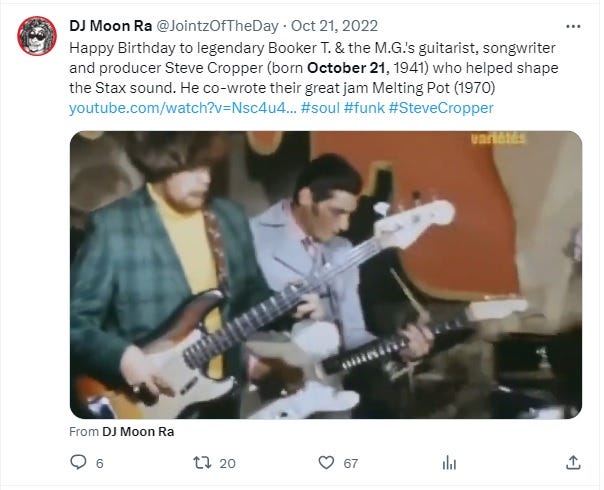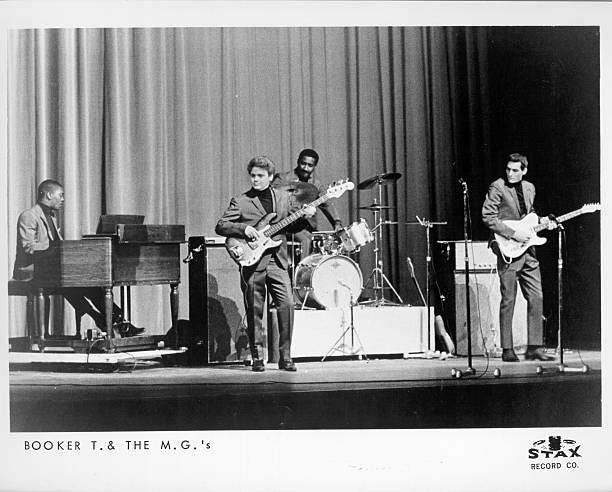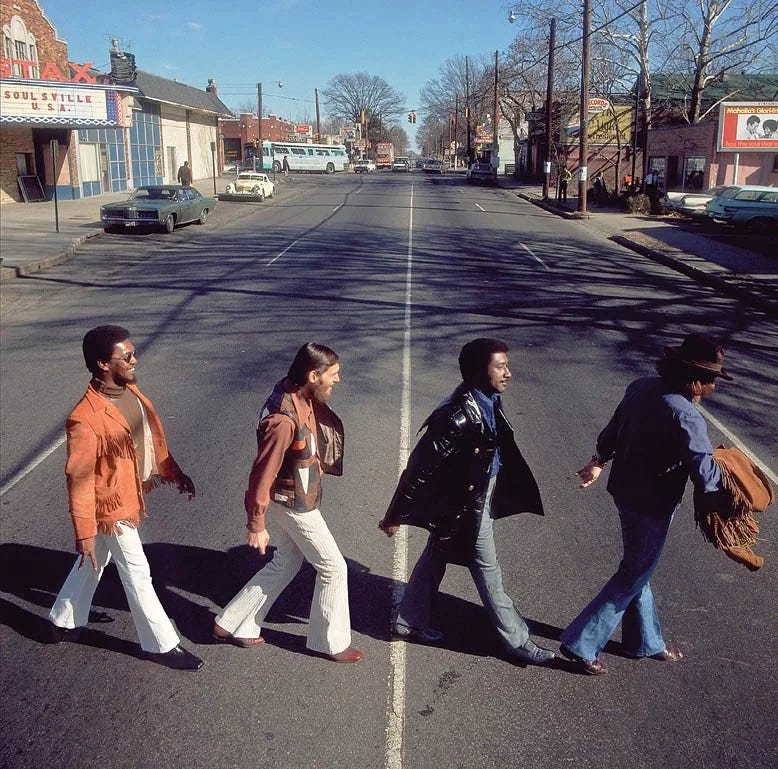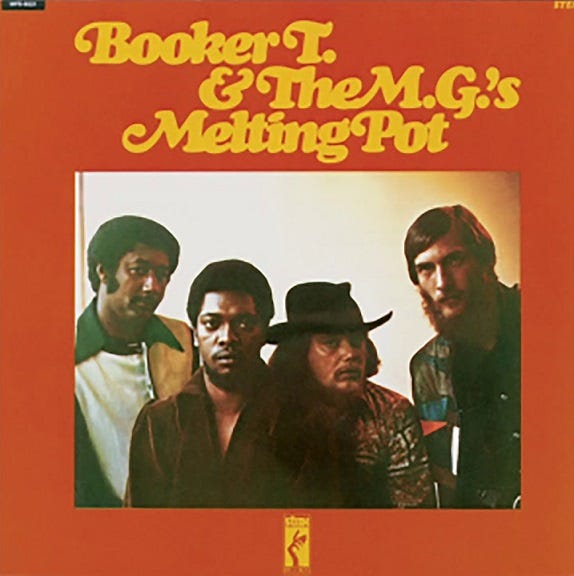Steve Cropper (born October 21, 1941) – Melting Pot (1970)
The legendary Booker T. & the M.G.'s guitarist co-wrote this stellar funk jam, an early hip hop block party fave and title track to the final album featuring their classic lineup.
Watch full video on YouTube.
View most updated version of this post on Substack.
Steve Cropper is a guitarist, songwriter, producer, and living legend who helped shaped the Stax sound in the 1960s as lead guitarist for the label’s house bands the Mar-Keys and Booker T. & the M.G.’s.
Born in Missouri, his family moved to Memphis, TN when he was nine years old. He started playing guitar at age 14, influenced by R&B and rock’n’roll guitarists including Chuck Berry, Chet Atkins, and Lowman “Pete” Pauling of the “5” Royales. While he was in high school, he formed The Royal Spades along with fellow guitarist Charlie Freeman, bassist Donald “Duck” Dunn, keyboardist Jerry Lee “Smoochy” Smith, singer Ronnie “Stoots” Angel, Don Nix on baritone sax, trumpeter Wayne Jackson, and tenor sax player Charles “Packy” Axton.
Although Axton’s mother Estelle and his uncle Jim Stewart were co-owners of the Memphis label Satellite Records, the band were unable to convince them to put out their first record until 1961. By this point, the label had released singles by Rufus and Carla Thomas and secured a national distribution deal with Atlantic Records. Estelle Axton persuaded the band to change their name to the Mar-Keys, referencing the marquee that hung outside Satellite’s new studio in the the former Capitol Theatre in South Memphis. “Last Night” was a funky but polished instrumental that hit big when it was released that June, going to #2 R&B and #3 on the Billboard Hot 100.
It sold over a million copies and was the label’s first gold record. Cropper played organ on the track but not guitar. Years later, he explained why:
“Jerry Lee ‘Smoochy’ Smith came up with the piano riff that was played on organ. Since [producer Chips] Moman didn't want a guitar on it for whatever reason, I wound up playing the hold-down on the organ on the root note. It hurts me in the Mar-Keys history when people say I wasn’t in the Mar-Keys because there’s no guitar on ‘Last Night’ but I have to differ with them.”
“Last Night” was the first single on the Satellite label to be distributed nationally, although copies were also issued on Atlantic. A pre-existing California-based label called Satellite Records took notice and complained, which led Stewart and Axton to change their label’s name to Stax (a blend of their last names) in September, 1961.
The Mar-Keys became Stax’s first house band, and in early 1962 Cropper replaced the label’s original A&R director Chips Moman (who had produced “Last Night” and parted ways with the label in a dispute over its royalties). That spring, he joined with three other Stax session musicians to form a new group, Booker T. & the M.G.’s.
Cropper and organist Booker T. Jones, drummer Al Jackson Jr., and Mar-Keys bassist Lewie Steinberg were all scheduled to back former Sun Records artist Billy Lee Riley in the Stax studio one Sunday afternoon, but the session was canceled. They instead began jamming to one of Jones’ Hammond organ riffs, and Stewart recorded it. Cropper remembered another riff of Jones’ that they played next, one with a 12-bar blues bassline, and recorded a second track.
Before either track was named, they gave an acetate to Memphis DJ Reuben Washington of local radio station WLOK. He played the second track four times in a row, after which the station was deluged with calls from listeners asking how they could buy the record. The band wanted to call it “Funky Onions” but was overruled by Axton, who thought that “sounded like a cuss word.” It wound up titled “Green Onions,” and was initially released in May, 1962 on Stax subsidiary Volt as the B-side of the first single by Booker T. & the M.G.’s. “Behave Yourself” was on the A-side, the initial track they had recorded together.
Just like Washington had done, other DJ’s played “Green Onions” so much that the single was quickly re-issued with the sides flipped, and it rocketed to #1 R&B and #3 on the Hot 100, becoming another million seller. It was the title track to their debut album, released that October, which was the first LP issued on Stax. That fall it reached #33 on the Billboard 200 album charts.
Promotional photo from August, 1962.
From that point on, Booker T. & the M.G.’s released a steady stream of instrumental singles for Stax. They never had another hit as big as “Green Onions,” but did reach the R&B top-ten several more times during the mid to late sixties. Their primary contribution to the label’s success was serving as the core of its expanded house band, playing on hundreds of records by Stax artists including Otis Redding, Sam & Dave, Eddie Floyd, Johnnie Taylor, the Staple Singers, and Wilson Pickett. In 1965, M.G.’s bassist Lewie Steinberg was replaced by Donald “Duck” Dunn, another member of the Mar-Keys and one of Cropper’s original bandmates in The Royal Spades.
Cropper wrote and produced countless songs for the label. He teamed up with songwriter Eddie Floyd to write for Wilson Pickett, and together they penned his classic “Knock On Wood.” See our earlier post on Floyd for more on their collaborations, including the superb jam “Holding On With Both Hands” (1968) which Cropper produced and co-wrote with Floyd. In 1971, for Floyd’s album Down To Earth, the two of them co-wrote and co-produced the LP’s epic, psychedelic soul-flavored closing cut “Changing Love.”
That same year, Booker T. Jones left Stax Records and moved to California, primarily because he was unhappy with the many changes being instituted at the label by Al Bell. Hired as director of promotions in 1965, Bell had rebuilt the Stax roster with a slew of new artists after Otis Redding’s 1967 death in a plane crash led to the dissolution of its distribution deal with Atlantic and the larger label retaining the rights to Stax’s back catalog. Bell became co-owner of Stax along with Stewart in 1969 when Estelle Axton sold him her shares.
Between concert dates with Booker T. & the M.G.’s, Jones and the rest of the group made one final album for Stax, mostly recorded during 1970 at the Record Plant in New York City. Melting Pot was released that December and was the group’s biggest selling LP in years, hitting #2 on the R&B album charts. Highlights included the hard-hitting funk workout “Chicken Pox” and the stellar eight-minute long title track.
The edited single version of “Melting Pot” was a #21 R&B hit in the spring of ‘71 and reached #45 on the Hot 100. It became a funk classic and was one of the early tracks favored by hip hop DJ’s at NYC block parties in the 70s. Like almost every song on the LP, “Melting Pot” was co-written and co-produced by all four members of the group, with Cropper also serving as one of the album’s engineers.
Happy 82nd Birthday to the great Steve Cropper.
Further info:
“Guitarist Steve Cropper still haunted by Redding,” Reuters, February 20, 2007.
“Stax Guitar Legend Steve Cropper Opens Up About His Most Iconic, Soulful Songs,” interview by Corbin Rieff, Sonic Breadcrumbs, April 8, 2021.
“Steve Cropper's Passion Is Strong as Ever,” Nashville Scene, April 22, 2021.
#soul #funk #Stax #BookerT&theMGs #SteveCropper












Another excellent piece. Outstanding. 👍🏾🎼
Thanks so much for this wonderful tribute to Steve Cropper, one of my favorite guitarists and an extraordinary songwriter. One correction: Otis Redding died in 1967. It happened just as I was leaving college for home to spend Christmas with my family, and I was devastated. I’d seen Otis with high school friends earlier that spring at the Howard Theater in Washington, D.C., and his performance was unforgettable. His death cast a very dense, very black cloud over Christmas that month. I’ve never really recovered.